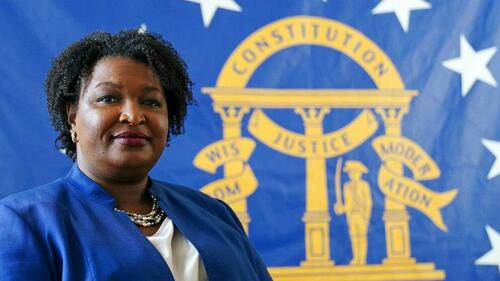
We previously discussed a federal court upholding the Georgia election law as constitutional this week, rejecting challenges based on voter suppression.
That did not appear to change the narrative for Democratic Georgia gubernatorial candidate Stacey Abrams, who is closely associated with the Fair Fight Action group that lost the case. Abrams claimed that the federal court actually found a “racist, discriminating system” and the law is “a voter suppression law that is already harming Georgians this year.” Indeed, while acknowledging the loss in court, the interview makes it sound like Abrams’ group largely prevailed rather than entirely lost their challenge on voter suppression.
Democrats have criticized Georgia rules enacted before and after the 2020 election as voter suppression. The provisions in this lawsuit concerned pre-2020 changes that allegedly made it “harder to register, harder to stay registered and ultimately harder to vote.” Both Stacey Abrams and Joe Biden denounced the Georgia laws in 2020 as voter suppression.
Conversely, Georgia has noted that the alleged “voter suppression” under the law turned out to be a voter enhancement. According to the secretary of state’s office, 1.9 million eligible voters participated in the 2022 primary contest compared to 1.2 million in 2018. Moreover, African-American turnout was 22% higher than any other primary election except for the 2020 presidential primary.
The Justice Department is continuing its own challenge of the post 2020 changes, which is further undermined by the analysis of Judge Jones on the pre 2020 provisions. The Justice Department is challenging stricter voter ID requirements, drop box regulations, shorter absentee ballot request deadlines and other provisions. However, it has not challenged similar or even more restrictive provisions in other states like Delaware.
Given the reasoning and precedent in the Jones opinion, such objections seem even less compelling particularly given the record turnout in the last election cycle despite both the pre-2020 and post-2020 changes.
Judge Jones did find problems on issues like training and felon voting regulations but did not find that they met the burden in establishing constitutional violations. He also recognized countervailing interests of the state on issues like felon matching procedures.
Nevertheless, Abrams seemed to claim vindication on the rejection of her claims on the pre-2020 changes. She stated on MSNBC’s “Deadline” that her opponent Gov. Brian Kemp (R) is “the architect of a voter suppression law that is already harming Georgians this year… he is a voter suppresser architect, and he is continuing to attack the right to vote in the state of Georgia.”
She then made this curious statement:
“There is a 288-page order that came down from a federal court on the last three claims during our Fair Fight Action. We did not win the claims. But if you read the 288-page order, repeatedly the federal judge said that Brian Kemp operated a racist, discriminatory system.”
It would be curious if the court found a “racist, discriminatory system” but upheld it under the Constitution. Abrams’ group challenged the law under the First and Fourteenth Amendments (Count I); the ban on racial discrimination in voting secured by the Fifteenth Amendment (Count II); violation of equal protection secured by the Fourteenth Amendment (Count III); violation of procedural due process secured by the Fourteenth Amendment (Count IV); and violation of Section 2 of the Voting Rights Act of 1965 (Count V). Those claims were rejected, not affirmed by the court. Judge Jones stated “although Georgia’s election system is not perfect, the challenged practices violate neither the constitution nor the VRA.”
Instead, this is what the court actually said: “the burden on voters is relatively low… plaintiffs have not provided direct evidence of a voter who was unable to vote, experienced longer wait times, was confused about voter registration status.”
Abrams also returned to the widely voiced objection to the bar on political groups giving food or water to those in line at polling places. The provision has been highlighted by critics, including President Joe Biden who repeatedly misrepresented the limitation.
Abrams objected that Kemp “made it illegal for people to get water in line. He outsourced voter suppression to white supremacists.”
The law does not prevent people from giving water to those standing in line. The law allows “self-service water from an unattended receptacle” for voters waiting in line. It also allows anyone to give water or food to any voters outside of a limited area around the polling place.
It is common to bar any political campaigning or activities within a certain number of feet (often 150 feet — or a shorter distance from any line extending beyond that area).
Here is the provision:
“(a) No person shall solicit votes in any manner or by any means or method, nor shall any person distribute or display any campaign material, nor shall any person give, offer to give, or participate in the giving of any money or gifts, including, but not limited to, food and drink, to an elector, nor shall any person solicit signatures for any petition, nor shall any person, other than election officials discharging their duties, establish or set up any tables or booths on any day in which ballots are being cast
(1) Within 150 feet of the outer edge of any building within which a polling place is
(2) Within any polling place; or
(3) Within 25 feet of any voter standing in line to vote at any polling place.”
The law then allows for “self-service water from an unattended receptacle to an elector waiting in line to vote.” It also does not limit any poll workers from supplying water to voters.
Georgia officials said that the impetus for the rule was that various political organizations in 2019 circumvented the no politicking rule by handing out food and water with actual food trucks set up for this purpose. The rule is designed to close that loophole. If campaigns or others are really concerned with just getting water to voters, they can still do so. They simply cannot take credit for it or directly engage voters in the limited area next to polling places.
The Abrams interview seems to be an exercise of the stage of grieving made famous by psychiatrist Elizabeth Kübler-Ross: denial, anger, bargaining, depression, and acceptance. The problem is that she seems stuck on denial.
We previously discussed a federal court upholding the Georgia election law as constitutional this week, rejecting challenges based on voter suppression.
That did not appear to change the narrative for Democratic Georgia gubernatorial candidate Stacey Abrams, who is closely associated with the Fair Fight Action group that lost the case. Abrams claimed that the federal court actually found a “racist, discriminating system” and the law is “a voter suppression law that is already harming Georgians this year.” Indeed, while acknowledging the loss in court, the interview makes it sound like Abrams’ group largely prevailed rather than entirely lost their challenge on voter suppression.
Democrats have criticized Georgia rules enacted before and after the 2020 election as voter suppression. The provisions in this lawsuit concerned pre-2020 changes that allegedly made it “harder to register, harder to stay registered and ultimately harder to vote.” Both Stacey Abrams and Joe Biden denounced the Georgia laws in 2020 as voter suppression.
Conversely, Georgia has noted that the alleged “voter suppression” under the law turned out to be a voter enhancement. According to the secretary of state’s office, 1.9 million eligible voters participated in the 2022 primary contest compared to 1.2 million in 2018. Moreover, African-American turnout was 22% higher than any other primary election except for the 2020 presidential primary.
The Justice Department is continuing its own challenge of the post 2020 changes, which is further undermined by the analysis of Judge Jones on the pre 2020 provisions. The Justice Department is challenging stricter voter ID requirements, drop box regulations, shorter absentee ballot request deadlines and other provisions. However, it has not challenged similar or even more restrictive provisions in other states like Delaware.
Given the reasoning and precedent in the Jones opinion, such objections seem even less compelling particularly given the record turnout in the last election cycle despite both the pre-2020 and post-2020 changes.
Judge Jones did find problems on issues like training and felon voting regulations but did not find that they met the burden in establishing constitutional violations. He also recognized countervailing interests of the state on issues like felon matching procedures.
Nevertheless, Abrams seemed to claim vindication on the rejection of her claims on the pre-2020 changes. She stated on MSNBC’s “Deadline” that her opponent Gov. Brian Kemp (R) is “the architect of a voter suppression law that is already harming Georgians this year… he is a voter suppresser architect, and he is continuing to attack the right to vote in the state of Georgia.”
She then made this curious statement:
“There is a 288-page order that came down from a federal court on the last three claims during our Fair Fight Action. We did not win the claims. But if you read the 288-page order, repeatedly the federal judge said that Brian Kemp operated a racist, discriminatory system.”
It would be curious if the court found a “racist, discriminatory system” but upheld it under the Constitution. Abrams’ group challenged the law under the First and Fourteenth Amendments (Count I); the ban on racial discrimination in voting secured by the Fifteenth Amendment (Count II); violation of equal protection secured by the Fourteenth Amendment (Count III); violation of procedural due process secured by the Fourteenth Amendment (Count IV); and violation of Section 2 of the Voting Rights Act of 1965 (Count V). Those claims were rejected, not affirmed by the court. Judge Jones stated “although Georgia’s election system is not perfect, the challenged practices violate neither the constitution nor the VRA.”
Instead, this is what the court actually said: “the burden on voters is relatively low… plaintiffs have not provided direct evidence of a voter who was unable to vote, experienced longer wait times, was confused about voter registration status.”
Abrams also returned to the widely voiced objection to the bar on political groups giving food or water to those in line at polling places. The provision has been highlighted by critics, including President Joe Biden who repeatedly misrepresented the limitation.
Abrams objected that Kemp “made it illegal for people to get water in line. He outsourced voter suppression to white supremacists.”
The law does not prevent people from giving water to those standing in line. The law allows “self-service water from an unattended receptacle” for voters waiting in line. It also allows anyone to give water or food to any voters outside of a limited area around the polling place.
It is common to bar any political campaigning or activities within a certain number of feet (often 150 feet — or a shorter distance from any line extending beyond that area).
Here is the provision:
“(a) No person shall solicit votes in any manner or by any means or method, nor shall any person distribute or display any campaign material, nor shall any person give, offer to give, or participate in the giving of any money or gifts, including, but not limited to, food and drink, to an elector, nor shall any person solicit signatures for any petition, nor shall any person, other than election officials discharging their duties, establish or set up any tables or booths on any day in which ballots are being cast
(1) Within 150 feet of the outer edge of any building within which a polling place is
(2) Within any polling place; or
(3) Within 25 feet of any voter standing in line to vote at any polling place.”
The law then allows for “self-service water from an unattended receptacle to an elector waiting in line to vote.” It also does not limit any poll workers from supplying water to voters.
Georgia officials said that the impetus for the rule was that various political organizations in 2019 circumvented the no politicking rule by handing out food and water with actual food trucks set up for this purpose. The rule is designed to close that loophole. If campaigns or others are really concerned with just getting water to voters, they can still do so. They simply cannot take credit for it or directly engage voters in the limited area next to polling places.
The Abrams interview seems to be an exercise of the stage of grieving made famous by psychiatrist Elizabeth Kübler-Ross: denial, anger, bargaining, depression, and acceptance. The problem is that she seems stuck on denial.





